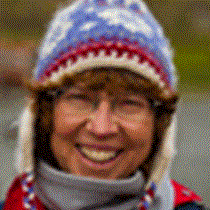Carcass Island and West Point Island, Falklands
What a wondrous wildlife extravangza we’ve had these past 10 days! With each new excursion, we’ve donned our red parkas and rubber boots. So it was a delightful change of pace to find ourselves stocking footed in the warm kitchen of Rob and Lorraine McGill on Carcass Island. You know the saying, “If I knew you were coming, I’d have baked a cake?” How about 18 varieties of ‘em! The hospitality and the teapot were brimming, and we were slow to depart. Carcass Island had many wonderful avian surprises as well, including our first look at the shy Magellanic penguin, the striated caracara (otherwise known as the “johnny rook”) and a blackish oystercatcher nesting right next to our landing site. When we first arrived, she left the nest briefly to expose one large egg. Several hours later, as we were leaving, she stood up once again and there were two!
During lunch, Captain Skog re-positioned the Endeavour to West Point Island for the afternoon adventure, and what a grand finale. At Devil’s Nose, an exposed sandstone outcropping above a wind-swept shore, we found two nesting species – the black-browed albatross and the rockhopper penguin. After seeing the albatross on the wing during our days at sea, it was lovely to see them up-close on their pedestal nests. The Falklands are the stronghold for the black-browed albatross, with roughly 95% of the world’s population breeding here. And who could resist a smile when in the company of a rockhopper? Mixed in among the tussock grass, these brightly crested penguins were making their way to and from the sea. While silent in transit, they greet their mates with raucous calls that could be heard far away. We lingered in the moment, as we knew this was our last outing and didn’t want it to end. When we finally sauntered back (or hitched a ride in a Land Rover), the Falklands hospitality was out again, as Roddy and Lily Napier invited us in for another yummy tea. It couldn’t have been a better last day of landings, made even sweeter thanks to our Falkland hosts. Fare-thee-well new friends.
What a wondrous wildlife extravangza we’ve had these past 10 days! With each new excursion, we’ve donned our red parkas and rubber boots. So it was a delightful change of pace to find ourselves stocking footed in the warm kitchen of Rob and Lorraine McGill on Carcass Island. You know the saying, “If I knew you were coming, I’d have baked a cake?” How about 18 varieties of ‘em! The hospitality and the teapot were brimming, and we were slow to depart. Carcass Island had many wonderful avian surprises as well, including our first look at the shy Magellanic penguin, the striated caracara (otherwise known as the “johnny rook”) and a blackish oystercatcher nesting right next to our landing site. When we first arrived, she left the nest briefly to expose one large egg. Several hours later, as we were leaving, she stood up once again and there were two!
During lunch, Captain Skog re-positioned the Endeavour to West Point Island for the afternoon adventure, and what a grand finale. At Devil’s Nose, an exposed sandstone outcropping above a wind-swept shore, we found two nesting species – the black-browed albatross and the rockhopper penguin. After seeing the albatross on the wing during our days at sea, it was lovely to see them up-close on their pedestal nests. The Falklands are the stronghold for the black-browed albatross, with roughly 95% of the world’s population breeding here. And who could resist a smile when in the company of a rockhopper? Mixed in among the tussock grass, these brightly crested penguins were making their way to and from the sea. While silent in transit, they greet their mates with raucous calls that could be heard far away. We lingered in the moment, as we knew this was our last outing and didn’t want it to end. When we finally sauntered back (or hitched a ride in a Land Rover), the Falklands hospitality was out again, as Roddy and Lily Napier invited us in for another yummy tea. It couldn’t have been a better last day of landings, made even sweeter thanks to our Falkland hosts. Fare-thee-well new friends.




